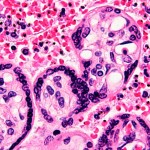 Promising results from a clinical trial mean that the world’s first malaria vaccine may be available by 2015 and could save hundreds of thousands of lives.
Promising results from a clinical trial mean that the world’s first malaria vaccine may be available by 2015 and could save hundreds of thousands of lives.
Promising results from a large-scale clinical trial mean that the world’s first malaria vaccine may be on the market by 2015 and could potentially save hundreds of thousands of lives a year.
The phase III clinical trial of more than 15 000 infants and young children in Africa found that the vaccine called RTS,S continued to protect the youngsters from malaria for up to 18 months after vaccination. The ongoing trial of the RTS,S vaccine is being conducted by 11 research centres in seven African countries, together with the PATH Malaria Vaccine Initiative and drug maker GlaxoSmithKline.
“It appears that the RTS,S candidate vaccine has the potential to have a significant public health impact,” Halidou Tinto, lead investigator from the Nanoro, Burkina Faso trial site in West Africa, said in a PATH news release.
“Preventing substantial numbers of malaria cases in a community would mean fewer hospital beds filled with sick children,” said Tinto, who is chair of the Clinical Trials Partnership Committee, which oversees the RTS,S phase III program. “Families would lose less time and money caring for these children and have more time for work or other activities. And of course the children themselves would reap the benefits of better health.”
During the 18-month follow-up period, there was a 46% reduction in the number of malaria cases in children aged 5 months to 17 months at first vaccination, working out to 941 fewer cases of malaria for every 1 000 children (a child can contract more than one case of malaria, the experts noted). Cases of severe malaria were reduced by 36% and malaria hospitalisations were reduced by 42%.
Among infants who were 6 to 12 weeks old at first vaccination, there was a 27% reduction in the number of malaria cases during the 18-month follow-up, which works out to 444 fewer cases of malaria for every 1 000 infants. There was also a 15% reduction in cases of severe malaria and 17% fewer hospitalisations for malaria, the investigators found.
Approval of vaccine
The latest findings from the trial were presented at the Multilateral Initiative on Malaria Pan African Conference in South Africa. Based on the data, vaccine maker GlaxoSmithKline plans to apply next year to have the vaccine approved by the European Medicines Agency. If the agency approves the vaccine, the World Health Organization said it could issue a recommendation for the vaccine as early as 2015.
Further data from 32 months’ follow-up and the impact of a fourth ‘booster’ dose given 18 months after the initial three doses are expected to become available in 2014.
“In Africa we experience nearly 600 000 deaths annually from malaria, mainly children under 5 years of age,” Tinto said.
“Many millions of malaria cases fill the wards of our hospitals. Progress is being made with bed nets and other measures, but we need more tools to battle this terrible disease,” Tinto explained.
Dr David Kaslow, vice president of product development at PATH, commented on the importance of the results. “Given the huge disease burden of malaria among African children, we cannot ignore what these latest results tell us about the potential for RTS,S to have a measurable and significant impact on the health of millions of young children in Africa,” he said in the news release.
“While we want to be careful about not getting ahead of the data, this trial continues to show that a malaria vaccine could potentially bring an important additional benefit beyond that provided by the tools already in use,” Kaslow added.
Source: health24

















